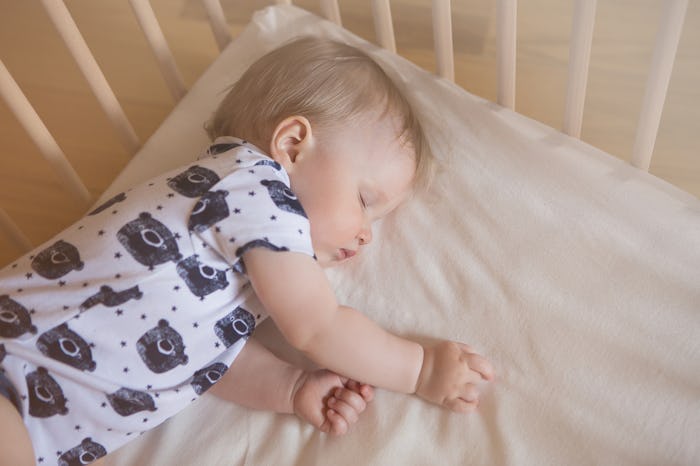Life

What Every New Mom Needs To Know About A Baby Rolling In Their Sleep
Wouldn't it be great if you could just put your baby to bed for a nap and have her stay still? Unfortunately, even the tiniest babies have a mind of their own, and they're more than happy to use those budding motor skills for acrobatics in the crib. Should you worry about your baby flipping on her face mid-snooze? There are some things that every new mom needs to know about a baby rolling in their sleep, and how to ensure your little one has safe slumbers.
To start with, you've probably had a zillion different healthcare professionals and baby guides tell you that your baby needs to sleep on her back. Generally, this is fantastic advice. According to the American Academy of Pediatrics, putting your infant to sleep on her back reduces the likelihood of SIDS, or sudden infant death syndrome, which is one of the leading causes of infant deaths. Even if you know how to protect your baby from SIDS, one issue remains: should you stop the little kiddo from rolling on her stomach while sleeping?
It turns out, you may not need to monitor your child's every slumbering movement. As explained by the National Institute of Child Health and Human Development's Safe to Sleep campaign, it's normal for your child to start rolling in her sleep around five months of age, and you do not need to return her to her back when this happens. As further noted by the NIH, as long as your baby starts her slumbers on her back, and her crib is free from loose bedding and other potential obstructions, then you are probably in the clear. Of course, every baby is unique, so discuss the safety of tummy sleeping with your pediatrician if you're concerned about your little one.
Once your baby is in the roly-poly phase, however, you may need to make a few adjustments to your bedtime routine. For instance, babies who are able to roll over should no longer be swaddled for sleep, because the swaddling could restrict her movements and breathing if she flips over, as explained by the Baby Sleep Site. By the time your little one is in this stage, you may want to invest in a sleep sack so she can move about in her crib without worrying about loose blankets.
All in all, rolling around during sleep is a normal part of your baby's development. As long as you provide a safe sleep environment, however, it should not present any dangers to your little one. And remember: once your baby is rolling, the crawling stage is not far away, so the real fun is about to begin.